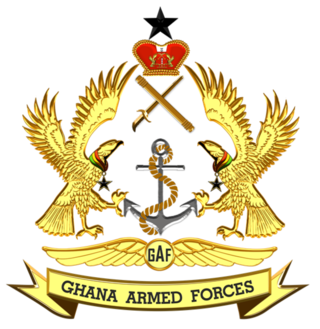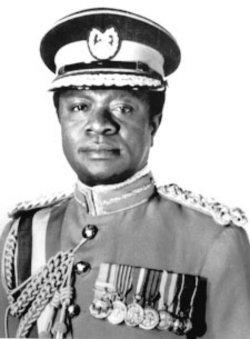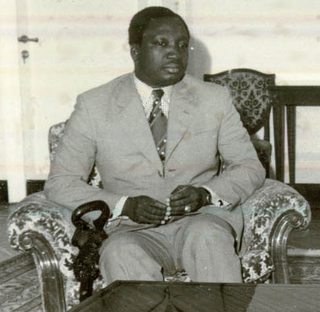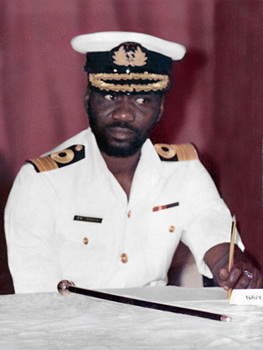Related Research Articles

The Ghana Armed Forces (GAF) is the state military organisation of Ghana,consisting of the Army (GA),Navy (GN),and Ghana Air Force.

Ignatius Kutu Acheampong was a Ghanaian military officer and politician who was the military head of state of Ghana from 13 January 1972 to 5 July 1978,when he was deposed in a palace coup. He was executed by firing squad on 16 June 1979.
Lieutenant General Akwasi Amankwaa Afrifa was a Ghanaian soldier,farmer,traditional ruler and politician. He was the head of state of Ghana and leader of the military government in 1969 and then chairman of the Presidential Commission between 1969 and 1970. He continued as a farmer and political activist. He was elected a member of Parliament in 1979,but he was executed before he could take his seat. He was executed together with two other former heads of state,General Kutu Acheampong and General Fred Akuffo,and five other generals,in June 1979. He was also popularly referred to by his title Okatakyie Akwasi Amankwaa Afrifa and was in addition the abakomahene of Krobo in the Asante-Mampong Traditional Area of the Ashanti Region of Ghana.
Major General Nathan Apea Aferi was a soldier and politician in Ghana. He was a former Chief of the Defence Staff of Ghana. He also served briefly as Foreign Minister of Ghana.

The National Redemption Council (NRC) was the ruling Ghana military government from 13 January 1972 to 9 October 1975. Its chairman was Colonel I. K. Acheampong,who was thus also the head of state of Ghana.

The Supreme Military Council (SMC) was the ruling government of Ghana from 9 October 1975 to 4 June 1979. Its chairman was Colonel I.K. Acheampong. He was also the Head of state of Ghana due to his chairmanship.

Colonel Roger Joseph Atogetipoli Felli was a soldier and politician who was once the foreign minister of Ghana.
Colonel Kwame R. M. Baah was a soldier and politician. He was the Ghanaian foreign minister between 1972 and 1975.
Major General Robert Ebenezer Abossey Kotei was a soldier,politician and track and field athlete. He was once the Chief of Defence Staff of the Ghana Armed Forces and also a member of the Supreme Military Council that ruled Ghana between 1975 and 1979. He was executed in 1979,following a military coup. He also held the Ghanaian high jump record for many years.

A referendum on the system of government was held in Ghana on 30 March 1978.

From 1966 to 1979,the nation of Ghana underwent a turbulent era as the Second Republic of Ghana. It began when the government of Kwame Nkrumah was overthrown on February 24,1966 by a military coup.

Rear Admiral Chemogoh Kevin Dzang was born at Nandom in the Upper West Region of Ghana. He was a naval officer and a former Chief of Naval Staff of the Ghana Navy. He also served Ghana as a Secretary of State for Defence and an ambassador to Japan with concurrent accreditation to the Commonwealth of Australia,Papua New Guinea,Singapore,South Korea,Malaysia,New Zealand,Indonesia,the Philippines,Brunei Darussalam and Thailand.
Major General Neville Alexander Odartey-Wellington (1934–1979) was a Ghanaian army officer who was Chief of Army Staff of the Ghana Army from 1978 to 1979. He died in action leading loyal troops against revolting forces during the 4 June 1979 military uprising in Ghana which toppled the Supreme Military Council II government led by Fred Akuffo.
Edward Kwaku Utuka was a Ghanaian military officer,who held the rank of major general of the Ghana Armed Forces,was a former border guards commander and member of the Supreme Military Council I &II,the ruling government of Ghana from 9 October 1975 to 4 June 1979.
Anthony Hugh Selormey is a Ghanaian soldier and politician. He was one of the members of the National Redemption Council (NRC) which overthrew the Progress Party government of Kofi Abrefa Busia on 13 January 1972. He also served briefly in the Supreme Military Council government which followed the NRC.
Lieutenant Colonel Chemogo Dodzil Benni is a Ghanaian soldier,politician and diplomat. He was a member of the National Redemption Council (NRC) military government which ruled Ghana between January 1972 and October 1975.
Lt Col Kofi Dovia Habada was a Ghanaian army officer and politician. He was the Volta Regional Commissioner from 1972 to May 1973,and the Greater Accra Regional Commissioner from 1973 to October 1975.
Colonel Emmanuel Obeng Nyante is a Ghanaian soldier and politician. He was a member of the National Redemption Council (NRC) government which ruled Ghana between January 1972 and October 1975 following a military coup led by Colonel Kutu Acheampong.
Colonel George Minyila was a Ghanaian military officer,diplomat and politician who served in various capacities in the National Redemption Council and Supreme Military Council (Ghana) governments as well as the military during his lifetime. He is best remembered for his reforms in the Eastern Region of Ghana,where he was assigned under the policy of former Head of State Ignatius Kutu Acheampong to deploy Ministers to regions they did not hail from.
Alhaji David Amadu Iddisah was a Ghanaian military officer and politician who served in various capacities in the National Redemption Council and Supreme Military Council (Ghana) governments as well as the military.
References
- ↑ Members of the National Redemption Council. Accra: Public Relations Department, Ghana. OCLC 404100555.
- 1 2 Bennet, Valerie Plave (1975). "Epilogue:Malcontents in Uniform". In Austin, Dennis; Luckham, Robin (eds.). Politicians and Soldiers in Ghana, 1966–1972. London: Frank Cass and Company Limited. p. 305. ISBN 978-0714630496.
- 1 2 Singh, Naunihal (2014). "5. Coups from the Middle - Ghana 1972". Seizing Power : The Strategic Logic of Military Coups. Baltimore, Maryland: Johns Hopkins University Press. p. 139. ISBN 978-1421413365.
- ↑ "Daily Report, Foreign Radio Broadcasts". United States Central Intelligence Agency. 17 January 1972. p. W1. Retrieved 18 March 2021.
The rest are Maj A M. Baah, Maj K.B. Agbo, Maj A. Saloremy (sic) and Mr J.H. Cobbina, the new inspector general of police